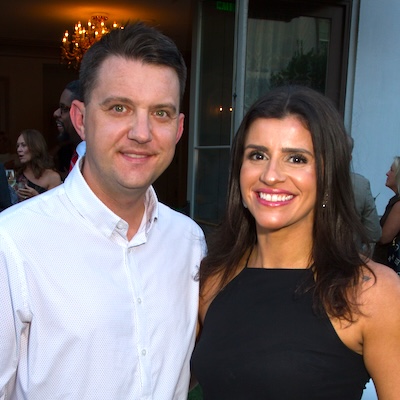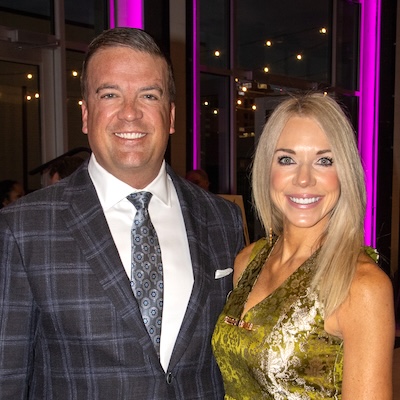Duquette Johnston has been in the upper echelons of Alabama music history for a few decades now, but life’s unexpected trials–and the understanding that waiting doesn’t have to be a bad thing–have prevented him from releasing an album since 2013’s “Rabbit Runs a Destiny”. Johnston has made up for lost time with his latest project, “The Social Animals”, which was released on February 25. The album is a collection of beautiful tunes that provide honest looks at Johnston’s life experiences as a family man and a caring Alabamian with a hectic past, along with reflections he had during the birth of his son and his wife Morgan Jones Johnston’s health issues that happened all around the pregnancy. It’s a beautiful listen, and it came from someone proudly part of the Birmingham community laying it all out for those who choose to hear.
Life changed for the Johnston family immediately after the release of “Rabbit Runs a Destiny,” when Morgan informed her husband they were having a child. “We were stoked, but then she was super sick,” Duquette shares, “To where I stopped touring, I stopped promoting. I don’t know what I was doing to pay bills.” His wife gave birth to their son in 2014, but unfortunately became even more ill after. Duquette remembers being with his wife during this time and receiving an uplifting text from Jeffery Cain of Communicating Vessels that “Dancing Song” off the album was up for an MTVU award, and thinking that’s great but there’s nothing he can do with that information right now. Family was the focus.
“So we just took all that time,” Duquette shares. He had produced a song for a television commercial that paid him well, which gave the family a brief buffer period. When things got tough financially, Duquette found odd jobs and found how supportive those who loved him could be–one old employer even paying multiple months of the family’s mortgage. “Just total community stepping up and helping in ways that I couldn’t have fathomed,” Duquette reflected, “So the break wasn’t on purpose but it happened and I wrote a ton of songs. I just would write at all hours of the night. I would write nonstop.”
Duquette estimates he journaled around 150 song ideas during this time. Some were simply riffs, some were determined to be better fits for future albums, “and then there’s the songs when I write I know I need to go towards. I know which ones I need to chase. Like I can’t get them out of my head. They keep coming up.” Once he was able to get into a studio, the inspired musician did more pre-production than he had for any other album. He demoed every song with Bradley Timko at Communicating Vessels right down the road from the Johnston family’s fantastic store, Club Duquette in Woodlawn. He was demoing a song a day, not focused on perfection by any means–just getting the desired sonic direction recorded. He did so by building the proper drum beats and enlisting the help of singer Rachel Roberts for the process.
Duquette would then take these demos to John Agnello, who came on board the project and the duo started booking studio dates with a hyperfocus. The highly-respected producer would tell him to work on some tracks, and Johnston would either adjust or place these songs to the side–something he says a younger him wouldn’t have done so cheerfully. A wiser Duquette sees the power in listening with purpose. “Learn to trust people you’re collaborating with. If you’re going to collaborate with them, really trust them,” Johnston shares, “Especially a producer like John Agnello. Why have them there if you’re not going to listen to their guidance?” The partners in music history spent one week at Sonic Youth’s New Jersey studio Echo Canyon doing rhythm tracks, one at Communicating Vessels doing overdubs, a week with Water Music NJ and Emily Rittenhouse mixing, and then the album went to be mastered by Greg Calbi at Sterling Sound.
The recording sessions featured an exciting roster of fantastic musicians, many of whom call Birmingham home. David Swatzell of Wray and Unwed Sailor is on guitars, Seth Brown from Lady Legs plays keys, Taylor Hollingsworth is on a couple tracks, Greg Slamen of Through the Sparks and more is featured, and singers like Roberts, Najee Waters, and Bekah Fox (in The Great Book of John and a major part of the Woodlawn Street Market) make for a great Magic City spotlight. After a title change and lots of recording, Duquette Johnston completed “The Social Animals” in the year 2017, and was ready to find a label to partner with for the release.

Single Lock Records was interested, but needed to push the release date back–which Duquette was fine with. “I’d already waited years, so why not?” was his reasoning. They came up with a stellar release plan, then the pandemic hit. They came up with a backup plan, and the pandemic stayed around. Two years later, the adjusted rollout for Johnston’s latest masterpiece is officially here–and he’s content with that timing. “It’s feeling good. I wasn’t in a hurry, I don’t feel like I have to be anymore,” he explains, “I want to release as much music as I can before I’m gone from this earth, but I want them to be good records.” He aims to grow in his artistry with each new record, and that takes time.
“The Social Animals'' is now here to bless our ears, with the tracks , “To My Daughters'', “Year to Run”, “Mystic”, and “Tonight” all being released beforehand–along with uplifting, Birmingham-centric music videos for the latter three. “I just hope people connect to the record and it etches a moment in time in their mind that whenever they hear it, it brings them back to that,” Duquette shares. He explains that he’s a believer in artists writing, creating, and then letting their work go to be freely interpreted by others. “I can tell you what a song is about for me,” he shares, “but you may connect to it because of one line and one thing, (and that’s) so cool because that’s your connection to it.”
“Most of the songs on the album were written starting right before my son was born, and all during that time. So it’s about my family,” Johnston shares, “It’s about things from my wife and I’s past and sorting through that, and sorting through some of my past. Some of it is just what I was witnessing and seeing in the world. ‘Tonight’ is the oldest song, and that was written during one of many waves of social injustices and violence in the country.” He goes on to further share of the song’s intended purpose: “I wanted everyone to scream and be alright. I wanted people to be able to sing together like ‘We can make this alright.’”
Duquette understands the importance of being vulnerable with his toughest moments, and what that can inspire in those who listen. Tracks like “Forgive Me” are drawn from deeply emotional moments from the artist’s past, when he hurt those he loved most and shattered cherished objects while in drug-fueled despair. “I was just a mess as a person at that time. Pissed off about every single person around me,” he shared, “So everything’s real personal to me.”
Family is a constant inspiration in his life, as Duquette fondly recalls days of his childhood riding in a “car packed with kids and the Doobie Brothers turned up really loud, or Steve Miller Band.” His mom was more into folk, while his dad was a little more rock-and-roll and old county. Both his grandmother and mom woke the kids up with music, and when he was growing up in Wyoming his parents would drive him nearly an hour to and from violin lessons to nurture his musical spirit. This passion extended to his uncle, who was wheelchair-bound after an unfortunate motorcycle accident the same year Duquette’s mom was pregnant with him in 1974. “There’s a song on the record about him called ‘Motorcycles’”, Johnston shares, “there’s a line where I say ‘Your visions from comas come true’. He talked about how I would be a musician.”
His time at the Etowah prison in 2004, and the circumstances that got him there, are other influences on Duquette’s life views. Johnston actually has a short documentary on his experience there, and a previous album is titled after the experience. He spent a lot of time reflecting on his own shortcomings that put him there, as well as the fact that he was a first-time drug offender in prison having to act crazy to not be stabbed after accidentally bumping into somebody on the stairs. “It’s easy to get behind when you’re already barely scraping by,” Johnston shares of some of his perspective after landing in the jail for 30 days after a failed drug test and the inability to pay fines, “And that’s coming from a dude who’s pretty freaking privileged. That had resources that other people didn’t and still barely could handle it.”
“If I’m believing that I’m here to try and help connect people, then I need to quit being afraid of being a little more raw. And being transparent,” Duquette shares of his motives, “My hope is that all my different experiences–from living a pretty privileged life to being locked up in prison–that I’m able to relate to more people. That I can connect with people on all sorts of levels where maybe other people couldn’t, and then maybe that gives me a chance to learn more from so many people.” He sees music as a tool for connecting us, and cherishes the ability to play a role.
One song that breaks away from Johnston’s typical approach to writing as a solo songwriter is “To My Daughters” which was written after an architect friend of Duquette’s in Birmingham paid to have a custom song written as part of a fun money-raiser for the last album. “It was someone I know intimately”, remembers Johnston, and this friend and Johnston both had young kids so the song just clicked. Side note: the backing vocals on this track are incredible–something Johnston attributes to sneaking into Birmingham jazz clubs as a 14-year-old to see legends like Cleve Eaton for the price of four expensive Coca-Colas and current jazz legend Kamasi Washington and musical mastermind Richard Swift’s layering of vocals to use like an instrument.
The violin-playing kid in Wyoming knew music would always be a part of his life–he was just too rowdy for that specific instrument. “I was constantly in a cast of some kind,” Johnston laughs. His older brother getting a guitar and teaching him to play Pink Floyd would make his path more clear. “We would sit at the cassette deck, and rewind it and learn. So music has just been constant in my life always,” Duquette reflects, “It’s been my connection to who I am. I’ve told people ‘No matter what I do, I will always make music.’”
That brother would end up being a doctor, and Duquette thought he’d be the same when he originally moved in with him at UAB after highschool–but he soon met his future Verbena bandmates and quickly knew that they were on to something big. Johnston dropped out 9 weeks into the semester, and the band would be fielding record deals and publishing offers just a few short years later. “We worked our asses off,” Johnston states, and they waited on the right deals–“We had really good advisors around us.” Since his departure from the band Johnston’s only grown as a songwriter, and found new outlets like the beautiful Club Duquette he shares with his visual artists wife, to explore new artistic avenues. For all the growth, they always have a constant core. “Music is center to our life,” he shares, going on to laugh while saying, “We connected over our love of Bad Company.”
He sees a similar growth in the city he calls home. From his days of sneaking off to punk rock shows on Morris Ave. and Dr. Jekyll's to the bands who put our state on the musical map in the 70s. The hip-hop shows at Woodlawn Heights have turned into a larger assortment of exciting venues. The 80s bands like Electric Circus, Primitons, Tim Boykin, Bone Dali, and more prepared the path for Verbena, Remy Zero, and their accomplices. “Now though, the amount of music coming out of this town is incredible. In Woodlawn alone, there are three recording studios on this block and two record labels. And that’s just the tip of the iceberg,” he shares, “There’s just a ton going on that I think is amazing. I hope that this city will continue to embrace local music. Birmingham Mountain Radio plays tons of local bands, and there’s good shows with more venues opening. It’s crazy to have watched it evolve the way it is.”
Duquette’s belief in his community, and his community’s belief in him is the only reason this album was possible. “A record does not happen with just me,” Johnston states, “It’s really been a massive community effort.” He goes on to share, “I was able to make the record because Jeffery Cain believed in my music and my songs. John Agnello produced it, that was 20 years I’d waited to make a record with him.” Single Lock “believed in me doing things a different way, that incorporates all of what my family does” and his manager Reed Watson has been there for him every step of the way. “It’s amazing to have people believe in you, and that want to help,” Duquette reflects, “It’s a wild ride out there.”
A wild ride indeed, but we’re happy Duquette gets to provide the soundtrack, and it’s okay if we have to wait a while for the next release–we’ll be enjoying the current wonders in the meantime.










